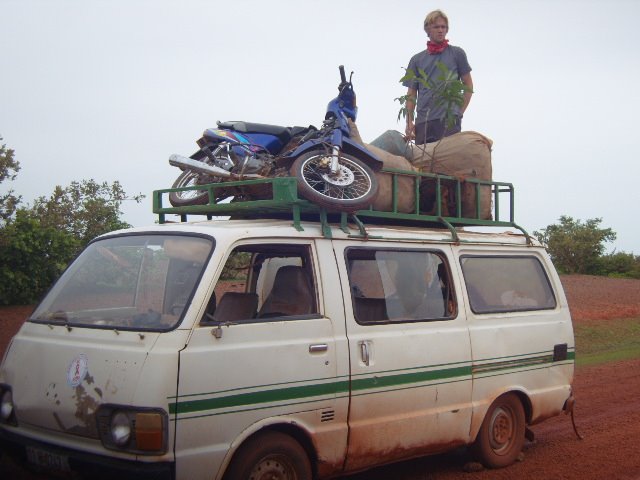Now that you know that Kua is doing well, I think it's appropriate that I update what I'm actually doing. After a few days with the trainees (I was scheduled to help facilitate a cross sector training session but ended up overseeing more than doing anything) and playing basketball for the first time in over a year (I made my first shot but air balled the second and many others terribly) I had just enough time to do some weeding before traveling north. Harmattan season has arrived and Northern Ghana is quickly approaching dry season. While the south of Ghana only suffers a few months without consistent rain, the three northern regions suffer through as many as five dry months each year.
Two days of travel brought me past stocked market towns and to the fast-drying north. I left Kumasi at 3am one day, left Tamale at 5am the following day and arrived in Kpendua around noon. After greeting cheifs, elders and other important people, I sat in on a Women's Group meeting and Cheri and I conducted an HIV/AIDS lesson for the local football team. 25 teen aged males gathered at the local clinic at 8pm for the lesson. We asked questions to gauge the general knowledge and later did our best to dispel rumors that HIV/AIDS is restricted to people living in big cities. As expected, the first few questions (after translation) were greeted with silence, the group warmed up to us and by the end, questions were flowing and several attendees were able to perform a proper condom demonstration only fifteen minutes after I made one of my own.
Yesterday (Sunday) morning, some local farmers gathered at Cheri's house at 8am for some farming techniques. I showed the group how to maximize space and efficiency during the dry season by using some urban farming techniques. As a group, we filled an empty 45 kilogram rice sack with soil and chicken manure with rocks stacked through the middle (water follows the path of the rocks and spreads more easily toward the bottom of the bag). We then cut holes around the outside of the bag and put seeds in each hole. As the seeds germinate, the seedlings will seek sunlight and grow out the side of the bag. While taking only four square feet of floor space, we were able to make space for nearly thirty seeds (pepper and onion). We also made a seedbed for other seeds in case the initial planting is not successful. The second lesson consisted of the preparation of manure tea (sounds appetizing right?). The group used chicken manure (I actually traveled through the country with at least 20 lbs. of chicken manure in my duffel bag) and wrapped it in fabric. The fabric was then suspended inside a bucket of water and covered with a clear sheet of plastic. The manure tea will sit for two weeks and after that time will have drawn nutrients from the manure and will be ready to spread on the farm.
Since I live in the fertile south, it's very difficult to convince farmers that there are more efficient ways to go about their daily work. When working in the north, where each and every farmer struggles to maintain a respectable farm, the lesson was received incredibly well. I fielded a series of questions and sent many farmers away happy with what onion seeds remained.
I'm having a hard time gaining traction at my own site and my time in Kpendua was very refreshing. I'll travel to Accra for Thanksgiving (at the Ambassador's house) and then return to Bormase fresh.
I trudged through a swamped Tamale market today (a political rally brought thousands of spectators and their motorbikes) and I'm really dragging now. I'll be up at 4:30am tomorrow and have a 15 hour bus ride to look forward to.
Love to all
Ira
Monday, November 24, 2008
Subscribe to:
Post Comments (Atom)





No comments:
Post a Comment